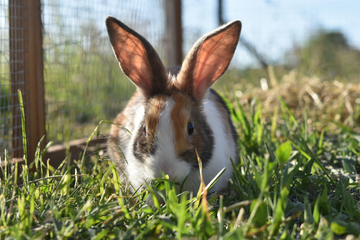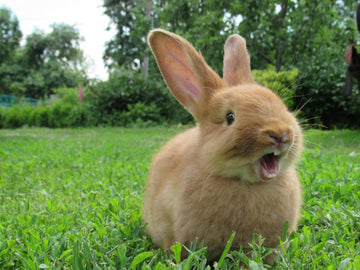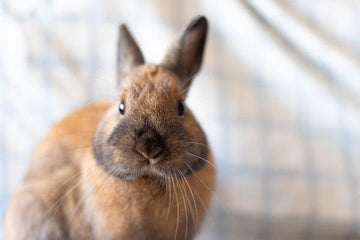"Why Is My Rabbit Licking Her Own Pee?"
You’ve had your rabbit for a while now, and you’ve gotten used to her routines. She zooms around the living room in the mornings, flops next to her favorite hidey house in the afternoon, and insists on getting the first pick of greens at dinner. She’s a little quirky, sure—but recently, she’s started doing something that has you raising an eyebrow.
Click Here For a Guide to Understanding Your Rabbits Diet.

One day you notice it: she pauses mid-hop, lowers her head, and starts licking up her own pee. At first, you wonder if you saw it right. Then it happens again. And now you’re asking yourself—why is my rabbit licking her own pee? Is it something serious, or just another one of those weird rabbit things?
While this rabbit behavior can be surprising, she might be trying to tell you something. The key is figuring out what—and making sure she’s healthy, comfortable, and not at risk for something more serious.
Let’s unpack what this behavior could mean and how to help her if it becomes a habit.
Understanding Natural Rabbit Grooming Habits
Rabbits are meticulous groomers. They spend hours each day licking their fur, cleaning their paws, and even grooming each other if they’re bonded with a friend. It’s part of how they stay clean and regulate body scent, which is crucial in the wild for survival.
Sometimes this grooming behavior crosses over into areas that make us raise our eyebrows—like licking urine. It’s easy to assume it's gross, but in a rabbit’s world, it might just be another way of keeping clean, or at least attempting to.
That said, there’s a big difference between grooming near a soiled spot and deliberately licking pee. And this is where we need to start asking more questions.
Health-Related Reasons for a Rabbit Licking Her Own Pee
One of the first things to consider is whether your rabbit is trying to tell you something about her health. Unusual behaviors often come with underlying medical causes. Licking pee might not just be about grooming—it could be about thirst, discomfort, or even nutrition.
Dehydration or Unmet Nutritional Needs
If your rabbit is not drinking enough water, she may try to compensate by licking any available liquid. This includes her own urine. In some cases, this behavior has been linked to inadequate hydration or a diet too low in moisture, especially if she’s not getting enough leafy greens or fresh hay.
A healthy rabbit diet includes plenty of timothy hay, a measured portion of fresh greens daily, and constant access to clean water. If any of those are missing, she might be looking for moisture wherever she can find it.
Urinary Tract Discomfort or Infection
Another reason your rabbit might be licking her own pee is that she’s feeling irritation around her urinary tract. This could be caused by a urinary tract infection (UTI), bladder sludge, or stones. If urination is painful, she might associate licking with soothing the area or trying to investigate what’s wrong.
Keep an eye out for symptoms like straining to urinate, a hunched posture, or urinating outside the litter box. Any of these signs could indicate a UTI or other urinary problem and should be addressed by a rabbit-savvy vet immediately.

Behavioral and Environmental Factors Behind a Rabbit Licking Her Own Pee
While health concerns are important to rule out first, the environment your rabbit lives in plays a huge role in her behavior. Stress, boredom, and territorial behavior are all common in domestic rabbits—and they often manifest in odd ways.
Stress or Anxiety
Has anything in your rabbit’s world changed lately? A new pet, a change in schedule, or even moving her enclosure to a different room can cause stress. Stress in rabbits can lead to self-soothing behaviors. Licking is a common one.
If your rabbit is licking pee in a particular corner or spot repeatedly, it might be part of an anxiety response. In the same way, some stressed animals pace or chew on bars, your rabbit may have adopted this behavior as a coping mechanism.
Territorial Marking or Scent Identification
Rabbits communicate through scent, and urine is a strong part of their signature. When a rabbit licks their own pee, they may be identifying their scent—especially if they are in a shared space or around other animals. This is more common in unspayed females or unneutered males, who are more likely to display territorial behavior.
If you haven’t had your rabbit spayed or neutered yet, this may help resolve a range of behavioral issues, including obsessive licking or marking behaviors.
How Cleanliness and Housing Setup Can Affect Rabbit Behavior
Sometimes, the issue is more about the setup than the rabbit. An enclosure that’s not cleaned regularly can lead to behaviors like pee-licking. If a rabbit is living in a space with frequent urine spots, she may simply be trying to clean it up in the only way she knows how.
This is especially true for rabbits without a litter box or with a box that isn’t cleaned often enough. Rabbits like a tidy space. If the smell of urine gets too strong, she may start cleaning up on her own—literally.
Consider upgrading your rabbit’s litter system. Use absorbent, rabbit-safe litter, and clean it daily. If you need help setting this up, our guide on how to set up a litter box for your rabbit will walk you through everything you need.
When to Worry About a Rabbit Licking Her Own Pee
Every rabbit is different. For some, licking a bit of urine here and there might be harmless. For others, it could be the first sign of a bigger issue. So when should you be concerned?

If the behavior is frequent, obsessive, or paired with other signs of discomfort—like weight loss, reduced appetite, or changes in litter box habits—it’s time to call your vet. You know your rabbit better than anyone. If something seems off, trust your instincts.
Also, keep in mind that prolonged contact with urine can lead to fur staining, skin irritation, and even infections. If your rabbit is spending a lot of time in dirty spots, she’s at risk for a condition called urine scald, which is painful and requires treatment.
Monitoring her litter box habits, water intake, and general behavior will give you more clues. If you're unsure, it's always better to get a professional opinion than to wait and see.
What to Do If You Notice Your Rabbit Licking Her Own Pee
Now that we’ve covered the why, let’s talk about what to do. You’ll need to take a mix of steps—both practical and medical—to stop this behavior and keep your rabbit healthy.
1. Evaluate Her Diet and Water Access
-
Make sure she has 24/7 access to clean, fresh water—preferably in a bowl rather than a bottle, which many rabbits prefer for easier drinking.
-
Check that she’s getting a variety of leafy greens and plenty of high-fiber hay. Nutrient deficiencies can cause behavioral shifts.
2. Clean and Refresh Her Enclosure Daily
-
Use rabbit-safe litter and clean the litter box once or twice a day.
-
Wipe down any pee spots on hard surfaces and replace soiled bedding as needed.
3. Address Stress and Environmental Triggers
-
Ensure she has a consistent routine and a quiet, safe area to retreat.
-
Offer enrichment—chew toys, tunnels, or even a digging box—to relieve boredom.
4. Get a Health Check
-
Visit a rabbit-savvy veterinarian to rule out UTIs, bladder issues, or hormonal causes.
This isn't just about stopping a weird behavior—it's about creating a healthier, happier life for your rabbit. The behavior is a clue. What matters is what you do with it.

Other Unusual Rabbit Behaviors That Could Be Related
Rabbits are expressive creatures. While they can’t speak, they communicate in many small, subtle ways. Licking pee might come with other signals that point to a bigger picture.
If your rabbit is also:
-
Digging excessively in corners or litter boxes
-
Circling or mounting objects
-
Thumping often, even when there's no obvious threat
-
Showing aggression or hiding more than usual
These could all be tied to hormonal shifts, stress, or physical discomfort. They’re not always alarming on their own, but when combined with licking pee, they may help your vet narrow down a cause.
In some cases, rabbits display these behaviors during puberty or as part of dominance. If your rabbit hasn’t been spayed or neutered, doing so can significantly reduce these patterns.
Helping Your Rabbit Develop Healthier Habits
Breaking a habit starts with understanding it. Once you've ruled out medical causes, you can focus on behavior training and environmental enrichment. Rabbits need stimulation and choice. When they’re bored or stressed, they look for control—and sometimes that shows up as odd behaviors.
Redirect the behavior with positive alternatives. If your rabbit tends to lick pee in a specific corner, block that area off and offer a foraging toy or a fresh patch of hay there instead. Add more safe zones and give her a variety of textures and scents to explore. Enrichment is key to mental well-being in rabbits.
Keep in mind that rabbits respond well to consistency. If you’re switching up her diet, housing, or playtime, do it gradually. Stability can reduce anxiety and prevent unwanted behaviors from forming in the first place.
Final Thoughts on Rabbit Licking Her Own Pee
It’s not just weird. It’s a signal. If you catch your rabbit licking her own pee, don’t brush it off as random or harmless. Even though some causes are minor—like trying to clean up or express stress—others can point to real health risks that need professional care.
The good news? Most of these issues are fixable with simple changes. Better hydration, cleaner housing, more enrichment, and regular vet checkups all go a long way. You don’t have to figure it out alone. Keeping your rabbit happy and healthy is a journey, and understanding her behavior is one of the best places to start.
Key Takeaways
-
Licking urine can be a sign of dehydration, stress, or even a medical issue like a UTI or bladder sludge.
-
Environmental factors like cleanliness, boredom, or housing setup may be encouraging the behavior.
-
If this happens more than once or comes with other symptoms, it’s time for a check-up with a rabbit-savvy vet.
Behavior like a rabbit licking her own pee may be unusual, but it’s never random. Your rabbit is talking—now you know how to listen.

Rabbit Is It Low Maintenance or More Work Than You Think?

Tips to Manage Rabbit Chewing Habits










